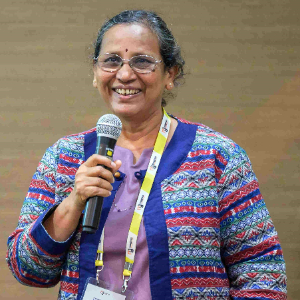Bijayalaxmi Mohanty, National University of Singapore, Singapore
Rice is one of the major global food crops. Although the overall yield of rice has been increasing, the growing population and adverse climatic changes pose huge challenges for their sustained production in the future. Drought stress severely affects rice production worldwide. It [....] » Read More



















Title : Recent advances in phytochemical techniques
Rameshkumar K B, Jawaharlal Nehru Tropical Botanic Garden and Research Institute, India
Will be Updated Soon...
Title : Waste streams become resource streams in the circular economy
Mary Cole, The University of Melbourne, Australia
Will be Updated Soon...
Title : Isolation and functional properties of biomolecules of plants and its application
Balagopalan Unni, GEMS Arts & Science College (Autonomous), India
The biodiversity of the North-East is very rich with 50% of the country’s flora and fauna and includes wild relatives of 132 identified and economically important species besides a large number of primitive plants and animals. Large number of biologically important molecule [....] » Read More
Title : Integrated approach to the exploration, collection characterization, and conservation of RET medicinal plants in India
P E Rajasekharan, ICAR-IIHR, India
Will be Updated Soon...
Title : Diagnosing plant abnormality
Mohammad Babadoost, University of Illinois, United States
Establishment of plants are affected by many biotic agents and abiotic disorders. Major biotic agents include pathogens, animal pests (insects and mites), and weeds. Major pathogen groups are fungi and oomycetes, prokaryotes (mostly bacteria), viruses and viroids, and nematodes. [....] » Read More
Title : Developing mountain mint as a commercial crop in Alabama, USA
Srinivasa Rao Mentreddy, Alabama A&M University, United States
Will be Updated Soon...
Title : Exploring the genetic diversity in tannin-rich forages to explain the large intra species variability in tannin content
Selina Sterup Moore, Aarhus University, Denmark
Tannin-rich forages hold great potential in improving the environmental impact of ruminant production systems as they can reduce methane emissions by inhibiting enteric fermentation while simultaneously enhancing soil carbon sequestration by slowing decomposition and lowering eco [....] » Read More
Title : Primed for the future: PGPR and the promise of sustainable, heritable crop resilience
Prashant Singh, Banaras Hindu University (BHU), India
Achieving Sustainable Development Goal (SDG) 2: Zero Hunger requires innovative strategies to ensure stable crop yields in the face of mounting global challenges. Developing disease-resistant crops offers a sustainable alternative to chemical pesticides, which often harm the envi [....] » Read More
Title : Revealing allelic variations in candidate genes associated with grain yield under salinity stress between two contrasting rice genotypes
Nisha Sulari Kottearachchi, Wayamba University of Sri Lanka, Sri Lanka
With the aim of assisting the breeding of salinity tolerant rice varieties by incorporating tolerance-associated candidate genes with desirable alleles, we previously re-sequenced the whole genome of two varieties, At354 (salinity tolerant) and Bg352 (salinity susceptible), using [....] » Read More
Title : Adaptive strategies of Aristida L. species across ecological zones of Pakistan: Linking soil characteristics with morphological and physiological traits
Iram Ijaz, University of Agriculture Faisalabad Pakistan, Pakistan
In Pakistan, the grass genus Aristida (Family Poaceae) is studied for its physiological traits, ecological distribution, and adaptive strategies across diverse environments. This study investigates four species—Aristida adscensionis, A. cyanantha, A. funiculata, and A. muta [....] » Read More
Title : Ethnobotanical survey and abundance of weeds in selected Manihot esculenta (cassava) Crantz farms in Osun state, Nigeria
Dada Caleb Mayokun, University of Ibadan, Nigeria
This study identified and classified weed species found in selected cassava farms in Osun State. It also surveyed and documented the ethnobotanical importance of weeds found in the farms and determined the abundance of weeds in the study area. These were with the view to providin [....] » Read More
Title : Morphorgenic effect of UV-light on two Abelmoschus esculentus (L.) Moench.(Okra) accessions
Nwoko Magnus Chinwendu, FUTO, Nigeria
Background and Objective: Okra (Abelmoschus esculentus) is an annual vegetable crop belonging to the family Malvaceae; with several cultivated species of economic importance, such as A. esculentus and A. caillei. This study was aimed to identify the interplay between Ultra- [....] » Read More
Title : Green technology and carbon sequestration study of semi-arid grazing lands at Sivagangai, Tamilnadu
Koildhasan Manoharan , Centre for Environment and Horticulture Research, India
Grazing lands play a major role for the fodder need of grazing animals. In India the available grazing lands do not fulfil the fodder demand. Most of the existing grazing lands are in the degrading stage due to over use of these lands. It very much affects its ecosystem and stabi [....] » Read More
Title : Incidence and geographical range of viruses inducing stunt disease in black pepper (Piper nigrum L.) vines across Malaysian farms
Khew Choy Yuen, Malaysian Pepper Board, Malaysia
Black pepper (Piper nigrum), known as "the king of spice," is a significant agricultural commodity in Malaysia, with substantial export earnings and increasing production rates. Despite its importance, black pepper vines face challenges from various diseases, particular [....] » Read More
Title : Biodiversity and conservation of fruit crops with their wild relatives: A review
Ashok Kumar, Guru Kashi University, India
The conservation of biodiversity within fruit crops is essential for sustaining both ecological and agricultural systems. Fruit crops, as integral components of nature's orchard, play a pivotal role in global food security and ecosystem health. India is one of the 12 mega bio [....] » Read More
Title : Post-transcriptional regulation of abiotic stress response by EGRBP42 in oil palm
Yeap Wan Chin, SD Guthrie Technology Centre Sdn Bhd, Malaysia
Abiotic stress is a significant limiting factor for plant growth and crop productivity. Understanding the molecular mechanisms that govern stress responses is critical for developing resilient crop varieties. In oil palm, we identified a heterogeneous nuclear ribonucleoprotein (h [....] » Read More
Title : Targeting alzheimer’s proteins: Binding and pharmacokinetics of Mimosa pudica leaf extracts
Chinwe Sylvanus Alisi, Federal University of Technology Owerri, Nigeria
This study revealed the bioactive volatile components of Mimosa pudica leaf hydro-ethanol extract using gas chromatography-mass spectrometry (GC-MS) and investigated the computational binding characteristics with β-Site APP-cleaving enzyme (BACE 1). Pharmacokinetic propertie [....] » Read More
Title : Nematodes – A burning problem in protected cultivation systems
Kavalipurapu Kranti KVVS, ICAR-IARI, India
Plant parasitic nematodes have emerged as formidable adversaries, rivaling soil borne fungal and bacterial pathogens in inflicting severe losses with protected cultivation systems in India. Their destructive impact is particularly evident in polyhouse grown vegetable crops such a [....] » Read More
Title : Multi-Locus genome-Wide association study reveal genomic regions underlying root system architecture traits in ethiopian sorghum germplasm
Masarat Elias , Oda Bultum University, Ethiopia
The identification of genomic regions underlying the root system architecture (RSA) is vital for improving crop abiotic stress tolerance. To improve sorghum (Sorghum bicolor L. Moench) for environmental stress tolerance, information on genetic variability and genomic regions link [....] » Read More
Title : The effect of fixation methods on gene expression from single-cell RNA sequencing in somatic embryogenesis cells of orchid (Phalaenopsis aphrodite)
Josephine Three Reyzeki, Bandung Institute of Technology, Indonesia
Single-cell RNA sequencing (scRNA-seq) advances transcriptomic analysis by enabling high-resolution gene expression profiling at the cellular level, thereby overcoming the limitations of bulk RNA sequencing in capturing heterogeneity. However, scRNA-seq for plant samples still fa [....] » Read More
Title : Mechanistic insight and in-vitro validation of phytochemical-functionalized ZNO nanoparticles as antioxidant and antimicrobial therapeutics against antimicrobial-resistant E. coli
Callistus Izunna IZUNNA Iheme, Federal University of Technology Owerri, Nigeria
Antimicrobial resistance (AMR) poses a significant threat to the global health sector. Zinc oxide nanoparticles (ZnO NPs) were synthesized with aqueous crude extract of Azadirachta indica, and the phytochemical compositions determined using Gas chromatography coupled to mass spec [....] » Read More
Title : Marker-assisted introgression to improve the oleic acid content in the TMV 7 groundnut (Arachis hypogaea L.) variety suitable for the oil industry
Arumugam M Pillai, Tamil Nadu Agricultural University, India
Improving the quality and shelf life of groundnut oil is a key objective in groundnut breeding programmes. In this study, marker-assisted introgression was employed to enhance the oleic acid content of the popular Indian groundnut variety TMV 7. A recessive mutation responsible f [....] » Read More
Title : Evaluation of agronomic performance of perennial ryegrass and tall fescue endophytically infected by neotyphodium under Tunisian conditions
Salma Ghariani, University of Tunis El Manar, Tunisia
The impact of endophyte infection on the agronomic performance of perennial ryegrass (Lolium perenne) and tall fescue (Festuca arundinacea) was evaluated using wild and cultivated plants either infected or not with Neotyphodium. Experimental plants were subjected to nutrient and [....] » Read More
Title : Plant diversity, structure, and functional use of three homegarden agroforestry system
Getahun Haile, Dilla University, Ethiopia
Traditional homegarden agroforestry systems (HGAFS), with their multi-strata arrangement, serve as a refuge for a wide range of plants, providing significant ecological value and household utility. The distribution of plant species diversity and their functional roles in home gar [....] » Read More
Title : Freshwater algae frontiers: Unlocking nature’s potential for a sustainable world
Arunkumar Nagarathinam, Kumaraguru Institute of Agriculture, India
Freshwater algae are at the forefront of green innovation due to their wide benefits in improving soil health, nutrient cycling, pest control biomolecules, carbon mitigation, and ecosystems restoration. Algal-based biofertilizers provide a strong substitute for synthetic inputs i [....] » Read More
Title : Traceability data integrity and lab informatics in plant tissue culture
Ajit Kumar, Pipra Solutions Private Limited, India
Tissue culture facilities struggle with opaque records, slow contamination tracing, and limited environmental control across the micropropagation lifecycle. We present TCLedger (PIPRA Solutions), a digital platform that delivers tamper-evident, real-time, end-to-end traceability [....] » Read More
Title : Mineral nutrient acquisition and antioxidant enzyme activities in two accessions of cowpea under drought stress
Mandilakhe Naku, Cape Peninsula University of Technology, South Africa
The significance of water stress in modulating nutrient acquisition and antioxidant enzyme activity was assessed in cowpea (Vigna unguiculata Walp). This study hypothesised that water deprivation will facilitate nutrient acquisition to upregulate antioxidant enzyme activities by [....] » Read More
Title : Commercialization of avocado fruit: Evidence from Wolaita and Kembata Tembero zone Ethiopia
Abera Abebe Dolaso, Wolaita Sodo University, Ethiopia
The policies in Ethiopia to advance the commercial orientation of farmers need identification of challenges at the farmer level and exhaustive actions to shift the farm sector. Further activities have to be done to change the country’s present subsistence-oriented farm prod [....] » Read More
Title : Full high added value recovery of agricultural green residual biomass to promote circular bioeconomy
Ahmed Mliki, Centre of Biotechnology of Borj-Cedria, Tunisia
Tree pruning represents an important source of biomass. Citrus fruits, for example, cultivated on more than 10 million hectares worldwide, produce each year around 25 million tonnes (an average of 2.5 t/ha) of low-value lignocellulosic biomass. This biomass thus constitutes an ex [....] » Read More
Title : Improving drought tolerance of vetiver grass (Chrysopogon zizanioides L. Roberty) by vermicompost and water-superabsorbent polymer application
Davoud Akhzari, Malayer University, Iran (Islamic Republic of)
Global warming, a critical aspect of climate change, is raising the Earth’s average temperature and altering rainfall distribution, leading to more frequent drought episodes. Drought stress is a severe abiotic factor that adversely affects plant survival, establishment, and [....] » Read More
Title : Coordination of lignin and pectin remodeling by a NAC transcription factor regulates seed abscission in sesame (Sesamum indicum L.)
Jinsu Lee, Seoul National University, Korea, Democratic People's Republic of
Seed shattering, an adaptation that enables seeds to disperse over a wide area, is essential for plant reproduction. However, in agriculture it poses a major challenge, since for crops such as sesame (Sesamum indicum L) it causes grain loss during harvest. Shattering typically oc [....] » Read More
Title : Report of pathogen identification and preliminary control technology on fruit rot and leaves blight on Macadamia ternifolia
Liu Yuxin, Nanjing Forestry University, China
Macadamia is native to Australia with important nutritional and economic value. After being introduced in my country, it has been planted in Yunnan, Guangxi and other places on a large scale. In this study, samples of macadamia fruit rot and leaf blight fungal diseases were colle [....] » Read More
Title : Genetic variability analysis in maize (Zea mays L.) materials for drought tolerance using miRNA molecular markers
Carlos Orozco Castillo, University of San Carlos, Guatemala
Maize (Zea mays L.) is one of the staple grains of great global importance, and in Guatemala, it constitutes the pillar of the nutritional and food security of its inhabitants (Martinez, 2022). The national production does not cover the internal demand, which is why this cereal m [....] » Read More
Title : Bacterial consortia promote tomato development and bioremediation in soils with heavy metal pollution
Abdul Khalil Gardezi, Colegio de Posgraduados, Mexico
The use of wastewater in agriculture has emerged as an alternative to address water scarcity and ensure food security. While crops under these conditions can be negatively affected, they also offer potential for reducing heavy metal accumulation in soils. Plant growth-promoting r [....] » Read More
Title : Using green macroalgae cladophora from saline waters in animal husbandry is a way to overcome iodine deficiency in humans
Nickolai Shadrin, A O Kovalevsky Institute of Biology of the Southern Seas (IBSS), Russian Federation
Around 68 % of the global population experiences varying degrees of iodine deficiency due to many areas are classified as iodine-deficient territories. Iodizing salt does not address the issue and has several adverse effects. The presentation investigates the factors contributing [....] » Read More
Title : Highly halotolerant green filamentous macroalgae cladophora vagabunda as a promising aquaculture target
Elena Anufriieva, A O Kovalevsky Institute of Biology of the Southern Seas (IBSS), Russian Federation
Cladophora is a genus of green, branching, filamentous macroalgae that are found worldwide in various water bodies. certain species of cladophora are traditionally consumed as food in Southeast Asian countries and Pacific islands. Its inherent qualities are becoming more and more [....] » Read More
Title : Sustainable utilization of natural resources and medicinal plants high quality development
Zhongsheng Guo, Institute of Soil and Water Conservation, China
In 2017, China first put forward the concept of high-quality development, so, Medicinal plants development had entered the new stage of high-quality development. Medicinal plants high quality development is to take some measures and methods to make the land produce the maximum ou [....] » Read More
Title : Genetic variability, heritability and genetic advance for yield and agronomic traits in winged bean
Ufuoma Lydia Akpojotor, International Institute of Tropical Agriculture, Nigeria
Winged bean (Psophocarpus tetragonolobus (L.) DC.) is an underutilized crop with valuable nutritional properties that can help alleviate nutritional insecurity. However, its global production remains low due to the lack of high-yielding varieties. Evaluating genetic variability i [....] » Read More
Title : Optimization of fermentation conditions and capsule formulation for enhanced bioactive compound delivery from medicinal mushrooms
Meenu, DCR University of Science and Technology, India
The enduring history of medicinal mushroom use in traditional healing practices, dating back to the Neolithic era, highlights their age-old recognition for nutritional and therapeutic benefits. These fungi offer a broad spectrum of potential health benefits, such as antimicrobial [....] » Read More
Title : CBL-Interacting protein kinase 21 (CIPK21) negatively regulates plant immune responses during Pseudomonas syringae infection
Amit Kumar, University of Delhi, India
Pathogen response requires a rapid and sustained increase in cytosolic calcium (Ca2+) levels. Calcineurin B-like (CBL)-interacting protein kinases (CIPKs) are downstream messenger of Ca2+-signature which regulate various physiological processes in plants. So, we characterized CIP [....] » Read More
Title : Field evaluation of nitrogen and growth regulator treatments on wheat productivity
Shubhendu Singh, Banaras Hindu University, India
To fulfil future food demands, it is imperative to increase the productivity of wheat (Triticum aestivum L.), a crucial cereal crop in India. The purpose of this study was to evaluate how wheat growth and yield were affected by varying nitrogen levels and foliar application of th [....] » Read More
Title : Integrated experimental and computational insights into the phytochemical composition and bioactivities of Withania somnifera varieties
Sarika Sharma, Banaras Hindu University, India
Ashwagandha (Withania somnifera), a highly valued medicinal plant of the Solanaceae family, exhibits remarkable therapeutic potential due to its diverse phytochemical composition. This study investigated six Ashwagandha varieties (Pushti, Poshita, Pratap, Chetak, NIM-118, and NIM [....] » Read More
Title : Endophytic Fusarium oxysporum GW controlling weed and an effective biostimulant for wheat growth
Syed Asim, Abdul Wali Khan University Mardan, Pakistan
The wheat crop is severely affected by weeds reducing its quantity and quality. One of the important weed control strategy is mechanical control based which is time and labor intensive. Synthetic weedicides is another mean of weed control strategy. However, extensive use of weedi [....] » Read More
Title : Potential of exopolysaccharides producing endophytic fungus Aspergillus niger to mitigate NaCl stress in Brassica napus L seedlings
Aneesa Nayab, Abdul Wali Khan University Mardan, Pakistan
Brassica napus L. (Rapeseed) is a major source of edible oil in Pakistan and the rest of the world. The crop contributes about 21% of global edible oil production. Due to increase in salinity levels around the world and rising food demand, there is a dire need to find strategies [....] » Read More